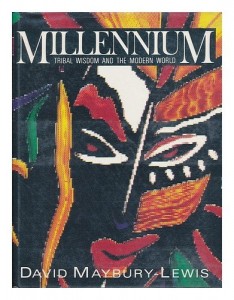By David Maybury-Lewis. 1992.
Chapter 5: Mistaken Identity
In everyday life, Xavante women are quite outspoken. Domestic violence against women and children is unheard of, and so is rape. It is the casual aggression against women in cities that shocks the Xavante…
Gender is only one of the many components of our sense of personal identity, and for now it is perhaps one of the most vexed and confusing parts. The beauty of the modern family, as we have just seen, is that it leaves you free to be yourself — at least in theory. But how do you know who you are? We have to go back to the very beginning of our lives, or perhaps before the beginning, to find clues to what makes up human identity.
Chapter 7: Inventing Reality
The separation of art from life in modern societies is not a trivial matter, for how can we define the good life and live it with grace if we leave aesthetics to specialists? We can neither abolish nor ignore the confusion, anxiety, and loneliness of our times — and we cannot recapture the unitary vision of tribal societies. We simply do not live like that anymore. What it does require is a determination that the aesthetic not be reduced to a commodity and ourselves to passive consumers of it, as well as a conviction that creativity and imagination are essential to our lives. It requires us to break the vicious cycle of compartmentalization that obliges us to live and work in a functional world that leaves little room for an aesthetic response. It requires us above all to understand that modern society separates: not only art from life, but life from death and all three from meaning. It is up to us to connect.
Chapter 9: The Tightrope of Power
The point is that modern society is intensely secular. Even those who regret this admit it. Social theorists tend to assume that modernization is itself a process of secularization, which has not only undermined people’s religious beliefs, but has also tended to deprive them of their spirituality.
Yet if we hold this view and act on it, busying ourselves with technological understanding and the accumulation of wealth in pursuit of pleasure, we are likely to feel that we have created a spiritual vacuum and to encounter that great loneliness of spirit of which Chief Seattle spoke so eloquently. Indeed it seems that those who live in the secular and industrialized West are already searching for ways to fill the vacuum in their lives left by organized religion and the numbing delights of mass society. We live in a world that prides itself on modernity, yet is hungry for wholeness, hungry for meaning. At the same time it is a world that marginalizes those very impulses that might fill the void. The pilgrimage toward the divine, the openness to knowledge that transcends ordinary experience, the very idea of feeling at one with the universe, these are impulses which we tolerate at the fringes, where they are held at bay by our indifference. The irony is that, after excluding the mystical tradition from our cultural mainstream and claiming to find it irrelevant to our concerns, so many of us feel empty without it.
It seems that we denigrate our capacity to dream and so condemn ourselves to live in a disenchanted world. Shorn of the knowledge that we are part of something greater than ourselves, we lose also the sense of responsibility that comes with it. It is this connectedness that tribal societies cherish and that we cannot bring ourselves to seek. But if we do not listen to other traditions, do not even listen to our inner selves, then what will the future hold for our stunted and overconfident civilization?
Chapter 10: At The Threshold: An Interview With David Maybury-Lewis
We ourselves do feel, I think, that we’ve lost a great deal of our sense of community and that individuals are very lonely in modern society, and that they certainly are not in tribal societies. Tribal people may be suffocated by the companionship that is forced upon them, but they are certainly not lonely.
For nine-tenths of the history of humankind, people lived in small societies that felt themselves and knew themselves to be part of the natural order of things.
One of the most general and devastating consequences of modernization seems to be that individuals feel they have no home, not only literally (as in the case of refugees) but emotionally. They feel rootless and alienated. In contrast, tribal societies–if they are able to maintain their land and their sense of identity–have a very strong sense of place, of home, which seems to satisfy an important human need.
Other people feel lonely, isolated, and alienated because in their own society processes are taking place that produce these results. Our very emphasis on individualism has led to a certain isolation of individuals within mass society and a feeling in those individuals that they are not very strongly connected to other peoples and other groups within the society.
So I think that one aspect of a sense of place–or the recovery of a sense of place, if you will, for those who have lost it–is a recovery of that sense of connection. And that means, of course, that we’ve got to start thinking about the ways in which we relate to people, not just the ways in which we are plugged into the productive system of the whole society.

